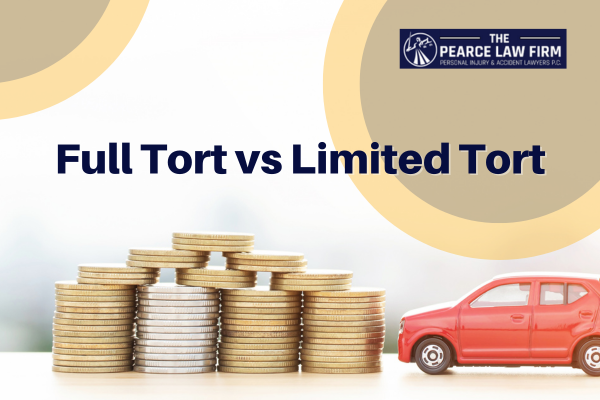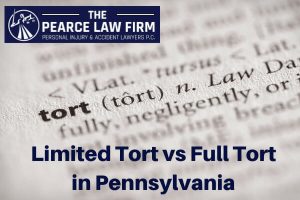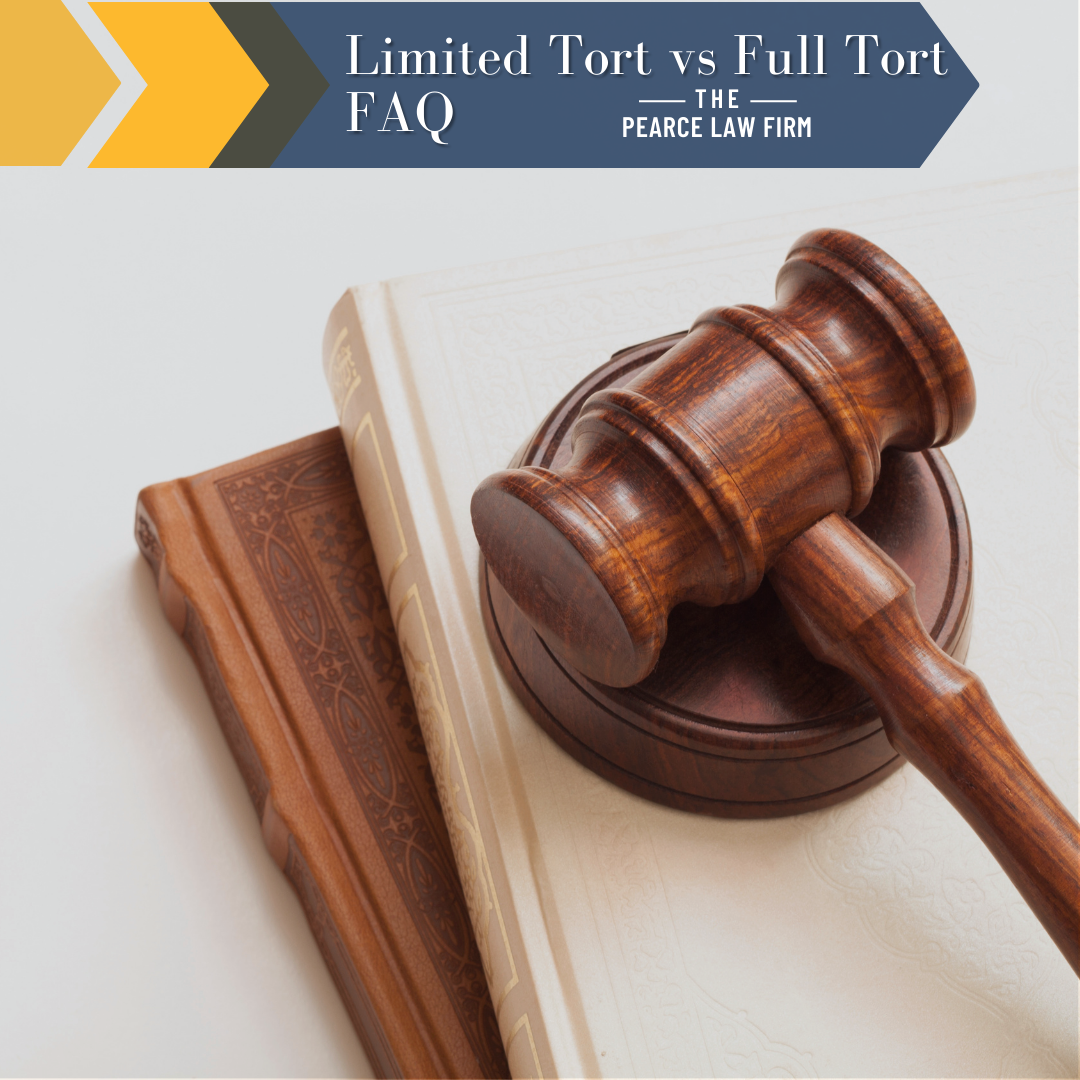Vehicle Accident in Pennsylvania?Call Us 24/7 – (215) 557-8686 or Email Us Here |
 |
The Difference Between Full Tort Vs Limited Tort in PA
Wondering what the differences are between full tort and limited tort? The difference between full tort and limited tort is that, following a car accident, full tort coverage allows an individual to pursue any type of compensation they may be entitled to, including compensation for pain and suffering. Whereas, limited tort coverage restricts an individual’s ability to seek compensation for pain and suffering unless the injuries they sustained meet certain legal thresholds. In Pennsylvania, insurance companies offer full tort coverage, which gives covered individuals the right to sue in court for full damages, and limited tort coverage, which restricts the ability to sue for pain and suffering.
Even if a person injured in a car accident chose limited tort on their Pennsylvania automobile insurance policy, there are exceptions to a limited tort that still allow the injured party to sue for pain and suffering.
Edith Pearce is a Personal Injury Attorney in Philadelphia. Call (215) 557-8686.
Exceptions to Limited Tort in Pennsylvania
Here’s how to understand the exceptions to limited tort in Pennsylvania. Under the Pennsylvania Motor Vehicle Responsibility Law, there are exceptions in which an injured party who chose limited tort or is insured by a limited tort policy can still recover a pain and suffering settlement as if he or she had a full tort policy. These exceptions can be found under the law at 75 Pa. Cons. Stat. § 1705(d), and include the following:
- Drunk Driver Caused The Accident – Limited tort does not apply if the driver at fault for the accident is convicted of driving under the influence (DUI) (DWI) or accepts Accelerated Rehabilitative Disposition or (ARD Program). The key to remember is that the person must be convicted of DUI or accepts ARD (often called “first-time” offender program).
- An Uninsured Driver Caused the Accident – Under Pennsylvania law, if the driver who caused the accident was uninsured, the injured party is not bound by limited tort. The law reads that limited tort does not apply “whenever the person at fault has not maintained financial responsibility as required” by Pennsylvania law. 75 Pa. Cons. Stat. § 1705(d)(1)(iv). This means that if the injured victim in a car accident has uninsured motorist coverage or UM insurance, a claim can be made against your own insurance company and you will not be bound by the limited tort option even if you chose limited tort under your own automobile policy.
- Car Registered in Another State – If the person who caused the accident was driving a vehicle registered in a state outside of Pennsylvania, limited tort does not apply. As many car accidents in the Philadelphia area are often caused by drivers with a car registered in New Jersey, New York, Maryland, or Delaware, this is a significant exception. Remember, it is not where the driver is from that controls, but rather where the car is registered. 75 Pa. Cons. Stat. § 1705(d)(1)(i).
-
Passenger on a Commercial Vehicle or a Motorcycle – If the injured party was a passenger on a taxi, bus, Uber, Lyft, rental vehicle, motorcycle, or any other type of vehicle that is not a “private passenger vehicle,” the injured party is entitled to full tort coverage even if they chose limited tort on their own policy. A private passenger vehicle does not include a vehicle that is rented to others (rental truck or rental car), used by the public (such as Uber, Lyft, or a taxi cab), or is principally used for commercial purposes (tractor-trailer truck, bus, public van). In such cases, it’s crucial to consult with a taxi accident lawyer to understand your rights. 75 Pa. Cons. Stat. § 1705(d)(3). A private passenger vehicle is defined as having four wheels, thus allowing motorcycle riders/passengers to obtain the exception to limited tort.
- Pedestrian or bicycle rider – A pedestrian or bicyclist injured by an automobile is not bound by limited tort, despite what they chose for their own automobile policy. So, if you or a loved one was crossing the street or riding a bike and was hit by a car, it does not matter that you chose limited tort on your own automobile policy.
- The injury involved a “Serious Injury” under the law – The law states, that “unless the injury sustained is a serious injury, each person who is bound by the limited tort election shall be precluded from maintaining an action for any noneconomic loss [pain and suffering].” So what does serious injury mean? The Pennsylvania Legislature has defined serious injury as “an injury resulting in death, serious impairment of a bodily function, or permanent disfigurement.” 75 Pa.C.S.A. § 1702. However, the Pennsylvania courts have held that all injuries are different and that even a soft tissue injury can constitute a “serious injury” where it is clearly documented and substantially impairs body function.
In determining whether a claimed impairment is “serious,” the Court must consider the following factors: (1) the extent of the impairment; (2) the particular body function impaired; (3) the length of the time that the impairment lasted; (4) the type of treatment required to correct the impairment; and (5) any other relevant factor. The Pennsylvania courts have held that the focus in not on just the type of injury, but rather on how the injuries affected a particular body function. Normally, medical testimony will be needed to prove a serious injury.
Some examples of cases where the Courts held the injury could be “serious” and it was up to the jury to determine the issue of whether the injury was serious include:
- Plaintiff continued to experience pain in neck, back, legs, along with headaches, could not sit or stand for long periods, and missed her children’s activities. Cadena v. Latch, 78 A.3d 636 (Pa. Super. 2013)
- Plaintiff sustained a herniated disc and underwent a course of physical therapy and was impaired in his ability to sleep, run and hike long distances, play with his child, ride his mountain bike and motorcycle although he only missed 3 days of work. Kelly v. Ziolko, 734 A.2d 893 (Pa. Super. Ct. 1999)
- Plaintiff suffered a bulging disc, pain radiating into her leg, had difficulty lifting heavy objects and playing with her daughter, and continued to experience pain for well over a year. Furman v. Shapiro, 721 A.2d 1125 (Pa. Super. 1998).
- Plaintiff suffered chronic pain syndrome; could not do many physical activities including housework and recreation without pain; and had difficulty sleeping.Robinson v. Upole, 750 A.2d 339 (Pa. Super. 2000).

Also, if you sustained scarring, we will document this with your medical doctor. Also, we will have you keep a journal of how your injuries have impacted your life such as not allowing you to play with your child or participate in social activities. If you are experiencing pain and symptoms, it is essential to continue treatment to document this to the insurance company. We will also show the insurance company how the injury has affected your job, either showing you have missed substantial time from work or that you have restrictions and cannot perform your job to the fullest, the way you used to.
- Other exceptions to limited tort – Other less common exceptions used to overcome limited tort include accidents caused by a defect in the design, manufacturing, repair, or maintenance of a vehicle. Lastly, an exception exists if the person who caused the accident intended to injure himself or another person.
Limited Tort vs Full Tort FAQ
- Do you have limited tort or full tort on your policy?
- Do you have uninsured or underinsured motorist coverage with or without stacking?
- Do you have income loss protection?
- Are there multiple policies of insurance under which you may get coverage?
- Could there be workers’ compensation coverage?
- What if the car accident happened out of state?
What You Need to Know if You Are Involved in a Car Accident Case
Questions that must be answered: Some lawyers do not know all the legal questions that must be investigated and answered to make sure you are fully compensated. Edith Pearce has inside knowledge of the auto insurance business, as she worked as a lawyer for years for a major auto insurance company. Let her inside knowledge work for you to obtain the maximum compensation either through settlement or trial.
Limited Tort vs Full Tort What’s On Your Policy?
Limited Tort:
Two types of insurance coverage can be purchased in Pennsylvania, which are known as “limited tort option” and “full tort option.” To find out if you have “limited tort” or “full tort” check the declaration page of your policy. Under Pennsylvania law, those who select the limited tort option may not bring suit for non-economic damages or “pain and suffering,” unless they have suffered a “serious injury.” A serious injury is defined by law as a personal injury resulting in death, permanent and serious disfigurement, or serious impairment of bodily function. At present, the courts across Pennsylvania are still interpreting what constitutes a “serious injury.” Generally, the courts will look to see if the injury has significantly affected your ability to perform your normal activities of daily living for a long period of time and caused you to suffer a significant amount of pain and discomfort during that period of time. Edith Pearce recommends you choose the “full tort” option or change to the “full tort” option. Choosing limited tort in PA saves you very little money in annual premiums, as little as $100 to $200, yet it may cost you thousands of dollars by not allowing you to recover for certain injuries. If you have “limited tort,” on your auto policy, you may still have a case and you need an experienced auto insurance dispute attorney like Edith Pearce to help prove you have a serious injury to allow you to recover.
Full Tort:
Full Tort allows you to retain unrestricted rights to bring suit against the negligent party in a car accident, whether your injury is considered “serious” or not. Do not be fooled by the insurance company’s claim to save you money. Ensure you select the full-tort option to safeguard yourself and your family.
What is full tort auto insurance? The main difference between full tort auto insurance and full coverage is that full tort coverage allows a policyholder to sue for a wider range of damages in the event of an at-fault accident.
Do You Have Uninsured or Underinsured Motorist Coverage With or Without Stacking?
Uninsured:
Uninsured Motorist Benefits (usually abbreviated UM on your policy) protect you and your family if you were injured in a car accident with an uninsured driver, and the driver at fault had no insurance or if the driver who caused the car accident left the scene of the accident without stopping (“hit and run”). What happens if you get in car accident without insurance? Even if you don’t have insurance, UM coverage can still help protect you by allowing you to recover damages through your own insurance company. UM coverage is inexpensive. You may choose to waive this coverage, which Edith Pearce strongly recommends against. By waiving UM coverage, you are choosing not to insure or protect yourself and your family, even though you have been responsible and purchased automobile insurance to protect a stranger if you cause the car accident. Don’t protect others and fail to protect yourself and your family. If you choose UM benefits, your insurance company will pay you the same as the other driver’s insurance company would have paid you if that person had insurance. Also, the insurance company is not allowed to raise your rates or refuse to renew coverage, because you made a claim for UM benefits. In other words, if the car accident was not your fault, your rates will not go up just because you made a claim.
Underinsured:
Underinsured Motorist Benefits (usually abbreviated UIM on your policy) protect you and your family if you were injured in a car accident and the driver at fault had insurance coverage, but the amount or limits of coverage were too low to compensate you for your injuries. For example, assume the driver at fault maintained the minimum amount of insurance allowed under Pennsylvania of $15,000 of liability coverage, which was paid to you. Also, assume that you were seriously injured in a car accident and the fair compensation for your injuries was $100,000. If you maintained underinsured motorist coverage of $100,000, your insurance company could pay you $85,000 additional benefits to allow you to be fully compensated (rather than just receiving $15,000). The insurance company is not permitted to raise your rates or refuse to renew coverage, merely because it paid underinsured benefits. If the car accident was not your fault, your rates will not go up just because you made a claim. Edith Pearce strongly recommends you maintain underinsured coverage. Don’t protect others and fail to protect yourself and your family. Failure to maintain underinsured coverage could result in you receiving only $15,000 for bodily injuries because the driver at fault purchased the cheapest auto insurance policy with minimum limits.
Stacking:
If you have chosen “Stacking” of your automobile insurance policy, you are permitted to add together or “stack” the coverages of each automobile owned and registered in Pennsylvania for uninsured (UM) or underinsured (UIM) coverage or insurance. For example, if each vehicle has $15,000/$30,000 coverage and there are two vehicles, the coverage would actually be equivalent to $30,000/$60,000 limits. Although stacking is optional, Edith Pearce strongly recommends that you choose or add stacking to your policy as it may provide an inexpensive means to increase your coverage. Although you may not know it, you may be adequately protecting others in a car accident, except yourself, by not having enough underinsured or uninsured coverage. Underinsured and Uninsured coverage protects you if you are injured in a car accident and the driver at fault does not have enough insurance or any insurance to compensate you for your injuries.
Do You Have Income Loss Protection?
Income loss protection is optional under Pennsylvania law. If you choose this coverage, generally 80% of gross income lost after the first five days of work missed can be recovered up to $1,000 per month. The minimum wage loss coverage you may purchase is $5,000.00. Edith Pearce recommends you purchase income loss protection at a level that provides a safety net. If you do not carry income loss coverage, you may not be able to collect money for your lost wages unless and until your case has been resolved either through a trial or by settlement.
Are There Multiple Policies of Insurance Under Which You May Get Coverage?
Multiple policies of insurance:
Generally, if you own more than one registered vehicle in Pennsylvania, stacking is permitted so that you may add together or “stack” your underinsured or uninsured coverage of each automobile. Also, the party that caused the car accident may have more than one policy available for you to recover against. For example, if the driver causing the car accident is driving a business vehicle, there may be coverage under a business automobile insurance policy, umbrella insurance coverage, and a personal automobile insurance policy.
Umbrella insurance:
An umbrella policy is an excess liability insurance coverage over and above that which is covered by an automobile insurance policy. In picking up where an automobile policy left off, it is an extra layer of coverage.
Could There be Workers’ Compensation Coverage?
Workers’ Compensation:
Workers’ Compensation (formerly known as workmen’s compensation) generally covers employees from injuries, which occur while working, and provides wage loss and medical benefits. Most people do not think of workers’ compensation coverage when they are involved in a car accident. If your car accident involved a trip or errand for your company, it may be covered under Pennsylvania workers’ compensation. Even a car accident while commuting to and from work can sometimes be covered under Pennsylvania workers’ compensation. While Pennsylvania does not allow workers’ compensation benefits if a car accident occurs when an employee is generally commuting to and from work, there are many exceptions to this rule. For example, where the employee’s duties included travel or where the employee was running an errand for his employer during his or her commute, workers’ compensation may apply. Other examples of automobile accidents that could be covered under workers’ compensation include when an employer is paying/reimbursing mileage as part of an employee’s salary and where the employee has no fixed place of work such as an office or building he reports to every day. For example, a health care provider or nurse that travels to different patients’ homes every day may be covered by workers’ compensation even if the car accident occurs on her commute home because she had “no fixed place of work.” Edith Pearce has the inside knowledge of working for an insurance company as an attorney and a defense firm for 10 years. She will be able to determine what insurance may apply to achieve the maximum compensation you deserve.
What if the Car Accident Happened Out of State?
Out of State Car Accidents:
If your injury or car accident occurred out of state, there are many issues, which you need an experienced personal injury car accident attorney to investigate. You may be bound by the state’s laws where the car accident occurred regarding when and how to bring a claim. You have a limited amount of time in which to file a claim in any state.
Contact The Pearce Law Firm Personal Injury & Accident Lawyers, P.C. Near You
If you’re involved in a car accident, it’s important to understand the differences between full tort and limited tort coverage. Having a nearby experienced insurance claims lawyer is important in evaluating your case. Edith Pearce worked for years as a lawyer for an automobile insurance company. She knows how to overcome the limited tort defense if the facts of your case meet one of the exceptions. She will have a thorough review of your automobile accident case and your insurance paperwork. Give our firm a call. We offer free consultations – so don’t risk your case to just anyone.
Check Out What Our Clients Have to Say About Us on Google:
“Would recommend this law firm to anyone! Edith, William and Nicole do everything they can for their clients and help them receive the justice they deserve. You will be in great hands with this firm!”
Kaitlin P.
Rating: 5/5 ⭐⭐⭐⭐⭐
See our 4.8 rating and read our 78 reviews on Google!







 Passenger on a Commercial Vehicle or a Motorcycle – If the injured party was a passenger on a
Passenger on a Commercial Vehicle or a Motorcycle – If the injured party was a passenger on a 
